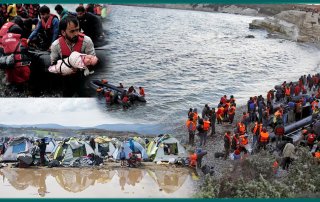Russia and Ukraine’s Tangled Relationship
March 2, 2020
Dr. James West and Krista Peterson
The Russia-Ukraine relationship begins in the 9th century with the establishment of Kievan-Rus, a trading center established on the banks of the Dnipro River as a loose confederation of Slavic, Nordic and Finnish tribes under the leadership of the Viking King Rurik. It lasted until the 13th century. Kievan-Rus adopted Christian Orthodoxy in 988 AD and over time became dominated by Slavs, in particular Russians. Over the intervening centuries, multiple myths and stories bolstering territorial claims and counter-claims arose, the capital was moved to Moscow after the 13th century Mongol invasions and a single Christian Orthodox church divided along linguistic lines. Although the Russians long claimed Ukraine its own and still consider Ukrainians their “little brothers,” in reality much of the territory was later ruled by a succession of European powers.Ukraine first established a short-lived independent state in 1917 but was then incorporated into the Soviet Union. The Republic became independent in 1991 after the fall of the Soviet Union but its sovereignty continues to be challenged time and again by Moscow. What are the myths that haunt this entangled relationship, why is Ukraine still so important to Moscow and what role does the US play in protecting Ukrainian independence?
Please note: this program will be divided into two parts with buffet lunch served between. It will begin with a 40 minute talk by Professor and Russian historian James West on the history and myths which envelope the Russian view of Ukraine. Post-lunch will consist of a panel and discussion with Dr. West and Krista Peterson on the weight of history on Ukraine today, its geopolitical significance and Ukraine’s importance not just to Russia but also the US and Europe.
Dr. James L. West, a specialist in pre-revolutionary Russian society, holds a PhD in history from Princeton University. He taught at the European University in St Petersburg, Russia from 2015-17, the sole remaining private university in the Russian Federation which was closed in 2017 by the Russian government in its drive to eliminate western liberal thought in the country.
He was a professor of history and humanities at Middlebury College (1995-2011) and professor of history at Trinity College, Hartford, Connecticut (1971-1995). During his academic career, he was the recipient of several prestigious US government grants to conduct and publish research in and on the Soviet Union which resulted in: Between Tsar and People (1991) and, Merchant Moscow, (1998) Princeton University Press and republished in Russia in 2008 which he edited.
In addition to Russian history, West has taught courses on the interplay of culture, society, intellectual thought and politics in Russia and Central Europe. He spoke at SFWAF’s first symposium “A Window on Russia” in 2006 on “Old Merchants and New Modernism: Moscow, Modern and Post-Modern 1905-2005 and at our 2019 symposium on “The Fascist Temptation” and our 2018 symposium on “Up Off Our Knees: The Search for a Usable Past for Russia’s Resurgence.”
Krista Peterson received a degree in radio/television/film from Northwestern University in 1993 but it was a presentation by the US Department of State during her college years that led her to join the Foreign Service. She arrived in Tegucigalpa, Honduras—her first foreign country other than Canada and Mexico—in September 1998 to live and work. Hurricane Mitch devasted Honduras two weeks later, which made for a very interesting two years in the consular section.
After Russian language training she arrived in Ukraine about one month before the terrorist attack in the US on September 11, 2001. Not long after that she consolidated many US agencies spread out across Kyiv and administrative functions housed in shipping containers on the Embassy grounds into two floors of a leased building. She has been an administrative specialist ever since and has worked for several different for profit businesses and nonprofit and educational organizations in Española and Santa Fe.








 Dr. Randall Halle, The Klaus W. Jonas Professor of German Film and Cultural Studies and the Director of the Film and Media Studies Program at University of Pittsburgh, presents a lecture and screening of a film that addresses many of the urgent challenges facing societies across the globe.
Dr. Randall Halle, The Klaus W. Jonas Professor of German Film and Cultural Studies and the Director of the Film and Media Studies Program at University of Pittsburgh, presents a lecture and screening of a film that addresses many of the urgent challenges facing societies across the globe.
